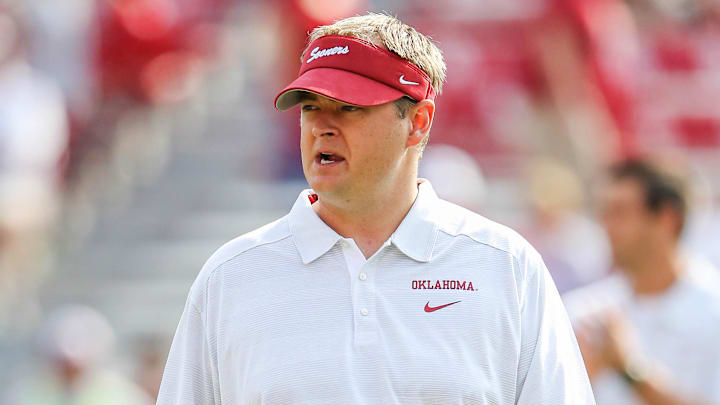Why Tennessee Coach Josh Heupel is No Longer Mad About Being Fired at Oklahoma

NORMAN — Don’t worry. Josh Heupel isn’t holding any grudges.
Sure, Heupel was fired from his job as Oklahoma’s offensive coordinator 10 years ago. And yes, he’s absolutely the same cutthroat competitor as a coach that he was as a southpaw quarterback.
But he’s gotten over the hurt from his sour departure from his alma mater.
“There's so many people that have been a huge part of my journey,” Heupel said this week, “that I … hopefully get a chance to say hi to a bunch of them.
“I wouldn't be here today at Tennessee if I didn't have all those experiences. So, tremendously grateful for all those people.”
Time has a way of soothing over hurt feelings and bruised egos — even for football coaches.
Nobody knows that better than Brent Venables.
“Sometimes,” Venables said Tuesday, “God, you know, His way’s the right way even though we don’t understand it. And we make a hard right-hand turn. And He’s got something better for you. That’s exactly what happened for Josh and his family.”
Heupel didn’t want to be fired when OU’s 2014 season devolved into abject disaster. But the way that 8-5 season ended, with a 40-6 loss to Venables’ Clemson squad, caused everyone to re-evaluate.
Bob Stoops wrote in his book that the day he fired Heupel was the single toughest day he ever had as a coach. Many times Stoops has declared Heupel the most valuable of all his former pupils because, more than any one player, Heupel directed OU’s overnight culture change from incompetent to incomparable.
But at the end of Heupel’s final two seasons of calling plays for Stoops, OU’s offense had slipped back toward incompetence.
In 2013, OU was 52nd nationally in total offense, 40th in scoring offense and 90th in passing offense. Still, the Sooners went 11-2 and ended the year with victories over No. 6 Oklahoma State and No. 3 Alabama.
But 2014 was a disaster. After an easy 4-0 start came a 37-33 loss at No. 25 TCU. OU beat a bad Charlie Strong-coached Texas team, but then lost 31-30 at home to No. 14 Kansas State. An easy win at Iowa State preceded a 48-14 blowout loss to Baylor in Norman — as much on Mike Stoops’ defense as on Heupel’s offense — before the Sooners rallied to win their next two against Texas Tech and Kansas.
The home finale against Oklahoma State, however, showcased a cascade of failures, from quarterback play to defensive shortcomings to head coaching blunders. Tyreek Hill’s second chance at a punt return forced overtime, and the QB-afflicted Sooners lost at home to an OSU team that was just trying to get bowl eligible.
Then came the loss to Clemson, where two years earlier Dabo Swinney had put Venables in charge of the Tigers’ defense — No. 1 in the nation in just his third season — and they put on a 40-6 showcase against an OU team that simply had no answers. Career backup Cole Stoudt amassed four touchdowns and 319 passing yards against Stoops’ defense, but it was once again Heupel’s offense — with 103 yards passing and four turnovers and just six measly points in the fourth quarter — that caused Bob Stoops to rethink everything.
“You can't play one-handed,” Stoops said that night. “ … Lack of execution in the passing game was a major factor as well.”
Sophomore Trevor Knight, who had been brilliant in the Sugar Bowl upset of Alabama one year before, completed just 17-of-37 passes and was intercepted three times.
For the season, OU was 10th in the nation in rushing offense, but just 83rd in passing offense.
“We need more balance,” Heupel said after the bowl game.
When Stoops was pressed in postgame interviews about the job security of his staff, he naturally bristled.
“I’m not gonna single people out,” he said.
But Heupel was on the hook for sketchy quarterback recruiting, quarterback development and quarterback play, as well as unrefined play-calling. After Landry Jones’ career trajectory quickly leveled out after his sophomore year, Blake Bell came in with 5-star credentials but never gained traction and eventually moved to tight end. Kendal Thompson, oldest son of former OU wishbone wizard Charles Thompson, signed with OU to finish what his dad started but was gone after two seasons as a backup. Cody Thomas, who eventually played Major League Baseball (he played this season in Japan), never developed as a quarterback.
Simply put, Heupel had better success developing QBs before he was elevated to offensive coordinator.
The downfall wasn’t all on Heupel. Stoops, smitten with the Johnny Football craze after what Johnny Manziel did to the Sooners in the 2012 Cotton Bowl at the end of his spectacular Heisman Trophy season, wanted Heupel to transition the offense from where he had taken Mike Leach’s Air Raid scheme with Jones to a read-option based system that featured the quarterback run game.
Under Heupel, Jones shattered nearly every OU passing record; he’s still No. 3 all-time in NCAA history with 16,646 passing yards. But Stoops wanted the next Manziel, and Heupel was tasked with learning all he could about the offense and implementing it immediately in Norman.
It was Knight, at the end of his redshirt season, who tormented the OU defense in practice as the team prepared for that fateful Cotton Bowl, and it was Knight who became the immediate future of the Sooners’ QB position.
The end result, painful as it was, took Oklahoma and Stoops himself in a new direction.
Stoops even considered retiring after the Russell Athletic Bowl. That’s how much it was going to hurt him to fire Heupel.
Instead, a year after replacing Iowa roommate and offensive tackles coach Bruce Kittle with Bill Bedenbaugh, Stoops showed more tough love and elite leadership, letting go of his co-offensive coordinators — championship-winning QB Heupel and Iowa teammate Jay Norvell — and bringing in Lincoln Riley to coach OU quarterbacks and call plays.
That — and a scrappy walk-on quarterback transfer from Texas Tech named Baker Mayfield — was just what Riley, Stoops and Oklahoma needed to pull off the transition and restore the roar in Norman.
Just like after the 2011 season when Stoops brought back his brother from Arizona to take over the defense for Venables, the tough choice ended up the right choice — for everyone.
Rather than stick around Norman as OU’s third Stoops brother, Venables decided to take Swinney’s offer to rebuild Clemson’s comically bad defense — and his career blossomed. The Tigers won two national championships, twice had the nation’s No. 1 overall defense, and now he’s the head coach at Oklahoma.
When he was fired, Heupel was hurting. But he quickly landed at Utah State, then had success as offensive coordinator at Missouri, then got the head coaching job at Central Florida, where the Knights went 12-1, 10-3 and 6-4 before he was hired at Tennessee.
In Knoxville, Heupel’s teams have gone 7-6, 11-2, 9-4 and are 3-0 and ranked No. 6 ahead of Saturday’s return to Norman.
Being replaced definitely stoked Venables’ fire, and three years later, it did the same for Heupel.
Now, Heupel brings that red-hot flame back to Owen Field, where he had so many great memories as a player, and plenty of good ones and bad ones as a coach.
“There can’t be someone with a stronger legacy,” Venables said. “He’s a national championship (quarterback). … Several games within that year (2000), Oklahoma was an underdog, or again, had to come from behind in those games where you really felt Sooner Magic was reignited. And he was a catalyst of that. And people won’t forget that.
“As we all know, that’s one of the coolest things about college football, it brings so much joy, you reflect to so many moments that enriches your life because of those moments of success and winning and overcoming. We all feel like we were a part of that — both personally and professionally.
“I think this is one of those times, you put the logo aside. He’s got an amazing legacy at this university.”
